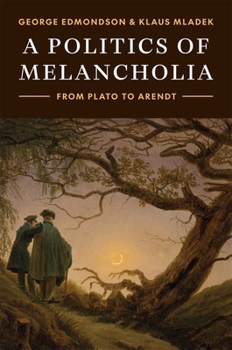A Politics of Melancholia: From Plato to Arendt
Why melancholia is a vital form of social critique and a catalyst for political renewal
Melancholia is wrongly condemned as a condition of withdrawal and despair that alienates its sufferer from community. Countering that misconception, A Politics of Melancholia reclaims an understanding of melancholia not as an affliction in need of a remedy but as an affirmative stance toward decay and ruination in political life, and restores the melancholic figure--by turns inventive and destructive, outraged and inspired--to their rightful place as the poet of political thought. George Edmondson and Klaus Mladek identify pivotal moments of political melancholia in ancient and modern texts, offering new perspectives on the death of Socrates in Plato's dialogues, the fratricide in Hamlet, Woyzeck's killing of Marie in Georg B chner's Woyzeck, the murder of Moses in Freud's thought, and the betrayal of the revolutionary idea that Hannah Arendt identifies in her critique of eighteenth-century revolutions. Melancholia emerges here as a disposition that is mournful but also jubilant, a mood of unbending disconsolation that remains faithful to a scene of downfall, to events that cannot be forgotten, and to things that cannot be governed. Recovering a tradition of thought that is both affirmative and hopeful, this eloquent book reveals how political melancholia embodies a shared condition of discontent that binds communities together and inspires change.Format:Hardcover
Language:English
ISBN:0691251290
ISBN13:9780691251295
Release Date:March 2024
Publisher:Princeton University Press
Length:304 Pages
Weight:1.40 lbs.
Dimensions:1.0" x 6.1" x 9.2"
Customer Reviews
0 rating





